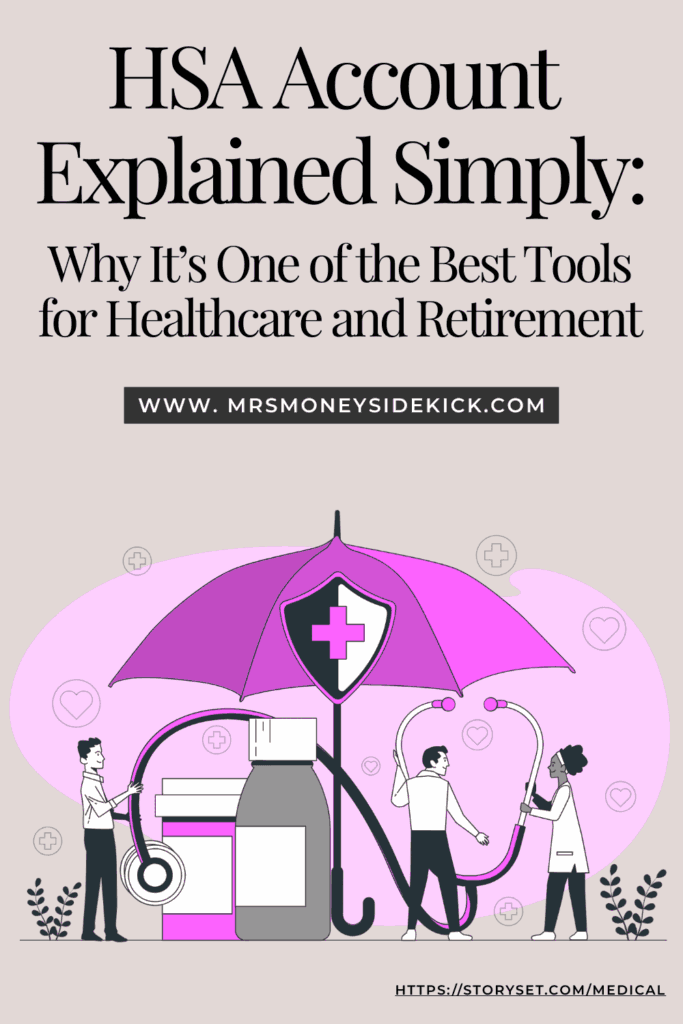HSA Account Explained Simply: Why It’s One of the Best Tools for Healthcare and Retirement
When you first hear about an HSA, it might sound like just another health insurance add-on. But the truth? It’s one of the most powerful, flexible tools you can have in your financial toolkit, not just for medical expenses now, but for retirement later. Here’s your HSA account explained simply, no jargon, no overwhelm, just what you need to know to take advantage of it today.
What Is an HSA?
Let’s start at the beginning.
An HSA, or Health Savings Account, is a tax-advantaged savings account for medical expenses. You can open one if you have a high-deductible health plan (HDHP) — and the money you put in can be used to pay for qualified healthcare expenses now or later.
Here’s the cool part: your contributions are tax-free, your money grows tax-free, and when you use it for eligible medical expenses, you can spend it tax-free too. That’s triple tax savings!
HSA Account Explained Simply: It’s a personal health fund that saves you money on taxes now and helps you prepare for medical costs in the future — even in retirement.
Why You Should Open an HSA
If you qualify, there are a ton of reasons to open one:
- You get free money: Many employers offer an HSA contribution, even if you don’t contribute anything yourself.
- It rolls over: Unlike FSA (flexible spending accounts), your HSA funds don’t expire at the end of the year.
- It’s yours forever: You take it with you if you switch jobs or health plans.
- You can invest it: Once you hit a minimum balance (usually $1,000 or $2,000), you can invest the rest in stocks or index funds — just like a retirement account.
What Can You Spend HSA Money On?
This is where most people (including me!) are surprised. Your HSA can be used for way more than just doctor visits.
Here’s your HSA account explained simply in terms of real-world uses:
Common Medical Expenses:
- Copays and deductibles
- Prescription meds
- Vision care (glasses, contacts, eye exams)
- Dental cleanings and treatments
Unexpected but eligible expenses:
- Over-the-counter meds like ibuprofen or cold medicine
- Menstrual products
- Sunscreen (SPF 15+)
- First aid kits and bandages
- Breast pumps and nursing supplies
- Acupuncture
- Chiropractic care
- Therapy sessions

✅ Pro-tip: Save your receipts. You can reimburse yourself years later — as long as the expense happened after you opened the account. There’s no expiration date for reimbursement.
Why It’s a Secret Retirement Tool
One of the most underrated uses of an HSA? Retirement savings. After age 65, you can withdraw HSA funds for any reason, even non-medical, without a penalty. (You’ll just pay regular income tax on non-medical withdrawals.) But if you use the money for medical costs (and let’s be honest, those don’t disappear with age), it’s still 100% tax-free. Healthcare costs in retirement are high and this is one of the best ways to prepare.
My Personal HSA Story
When I first enrolled in a high-deductible plan, I didn’t think much about the HSA. I assumed it was just for doctor visits or big medical bills, so I didn’t contribute much beyond the free money from my employer. Then one day, a coworker casually mentioned he was investing his HSA. Wait — what?! I had no idea you could invest that money.
I went down the rabbit hole, realized how much I missed out on, and started contributing more right away. I couldn’t believe I could’ve been getting reimbursed for years of over-the-counter medicines and sunscreen?!
HSA account explained simply: I was leaving tax-free money and investment growth on the table — don’t make the same mistake.
How to Maximize Your HSA (Tips & Tricks)
- Get the employer match (free money!)
- Save your receipts and reimburse yourself later when needed
- Use it for everyday healthcare spending and track it
- Invest the money once eligible, don’t leave it sitting in cash
- Use it as a long-term retirement healthcare fund
- Combine with an FSA for dependent care if available (not medical FSA)
2025 HSA Contribution Limits
- Individual: $4,300
- Family: $8,550
- Catch-up (age 55+): Extra $1,000
Remember, these contributions reduce your taxable income, so you’re saving money immediately just by using it.
Final Thoughts: HSA Account Explained Simply
If you’re eligible, an HSA is one of the most flexible and powerful tools for your finances. It’s a healthcare fund, an investment account, and a retirement resource, all in one!
Whether you’re just getting started or already contributing, make sure you’re using it to its full potential. Start with small contributions, save those receipts, and consider investing as your balance grows.
HSA account explained simply: It’s your quiet financial MVP, don’t sleep on it.
On your side,
Mrs. Money Sidekick
P.S. Want to learn more about smart money moves? Explore our Starting Out, Family Finances, and Money Essentials posts to keep building a strong financial foundation—one step at a time.
Featured Image Medical illustrations by Storyset









One Comment